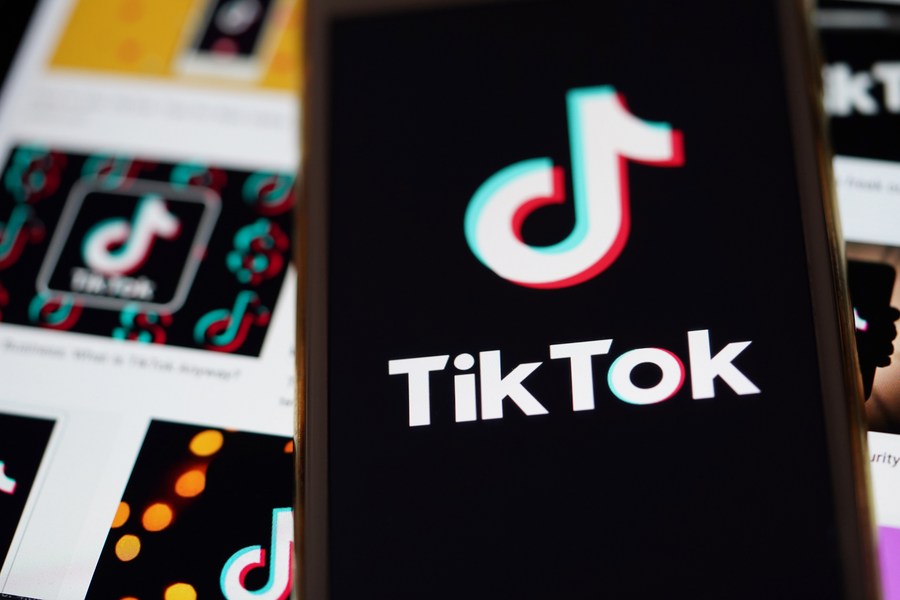The U.S. House of Representatives passed a bill after 40 minutes of debate on March 13, local time, calling for ByteDance to divest the widely popular short-video social platform, TikTok. If this bill is ultimately adopted, TikTok will face the risk of eventually being banned in the United States.
The legislation, known as the "Protecting Americans from Foreign Adversary Controlled Applications Act," was introduced by Congressman Mike Gallagher of Wisconsin and Congresswoman Elise Stefanik of New York, which passed by a vote of 352 to 65.
During the vote, a large crowd gathered outside the U.S. Congress, with many young people queuing to attend as observers, indicating significant public concern over the bill.

The logo of TikTok is seen on a smartphone screen in Arlington, Virginia, the United States, Aug. 30, 2020. (Photo/Xinhua)
TikTok ban bill: a robbery
According to the bill, TikTok's Chinese owner ByteDance must divest its U.S. assets within six months to keep TikTok available in the country. Otherwise, app store owners, such as Apple and Google, as well as internet hosting companies, will be prohibited from supporting TikTok and other apps related to ByteDance.
In fact, this is not the first time the U.S. has taken such an action. In August 2020, the Trump administration issued an executive order that required ByteDance to divest all ownership interests in TikTok's U.S. operations within 90 days, compelling TikTok to sell a significant stake to Oracle and Walmart. However, this executive order was halted by several U.S. courts after TikTok appealed, and it never comes into effect.
Compared with what the Trump administration did, this bill effectively amounts to robbery. Even if there are potential buyers this time, the urgent timeline will inevitably force ByteDance to negotiate under pressure, potentially leading to significant losses.
Following the passage of this bill at the House, the next step is to submit it to the Senate for voting. If it passes in the Senate, it will then to be signed by Joe Biden. Since Biden has made his stance clear that he'll ban TikTok if Congress passes the bill, the voting result in the Senate becomes the focal point.
Currently, Senate Majority Leader Chuck Schumer has not offered a timetable for a vote it, and prominent Republican senators like Rand Paul have openly expressed opposition to the bill. Therefore, the bill's fate in the Senate is yet to be determined and may face greater difficulty than in the House.
However, it should be noted that there is a broad consensus in both parties to target TikTok, making the bill's passage in the Senate a probable event. Therefore, TikTok still has difficult battles ahead.
According to Bloomberg, after the bill's passage, TikTok expressed disappointment in an internal memo, saying, "While we anticipated the outcome, I want to reemphasize that the Committee and the House votes are the beginning (not the end) of a long process."
In 2020, ByteDance proposed to form a new company with U.S. investment to handle TikTok's U.S. user data and content moderation, while other operations continued under TikTok's management. It also considered partnering with U.S. entities to establish a new company to operate TikTok's U.S. business.
This time, TikTok faces a more daunting challenge and must exhaust all means to resist U.S. bullying, as it has no other choice.
U.S. TikTok ban exposes the hollowness of its free economy
It is worth noting that the collusion between the U.S. government and Congress to unprecedentedly suppress TikTok, under the banner of "national security," also serves the purpose of gaining political benefits through suppressing Chinese companies.
The U.S. tech industry could also be affected. For instance, two years ago, American media revealed that Facebook paid TargetedVictory, one of America's largest pro-Republican consulting firms, to discredit TikTok through media and lobbying activities, shifting attention away from Facebook's own privacy and antitrust issues.
Moreover, Trump recently stated that while he believed TikTok posed a national security threat, banning it would drive young people "crazy." Trump also added that any action damaging the platform would benefit Facebook, which he referred to as the "enemy of the people." If Trump wins in this year's election, where will Facebook go?
In addition, suppressing TikTok will deprive TikTok's 170 million American individual users and millions of business users of their expression and operational platform, and also expose the truth behind America's purported free economy.
On February 28, Biden issued an executive order aiming to protect the sensitive personal data of Americans. It stated that the U.S. government would continue to engage with technology companies and stakeholders in privacy, security, fair competition to facilitate trusted free flow of data and commit to an open Internet in a reasonable and balanced manner. However, in the TikTok case, the U.S. has shown neither fairness nor openness.
The suppression of TikTok also exposes the hollowness of America's freedom of speech. In fact, senators from both parties have expressed concerns about whether the legislation targeting TikTok violates the First Amendment to the Constitution. After all, if TikTok can be banned today, another platform may be banned tomorrow.
Elon Musk's tweet about the legislation targeting TikTok also points this out. He wrote, "This law is not just about TikTok, it is about censorship and government control!" He further stated, "If it were just about TikTok, it would only cite 'foreign control' as the issue, but it does not."
A TikTok spokesperson, Alex Haurek, stated, "This process was secret, and the bill was jammed through for one reason: It’s a ban. We are hopeful that the Senate will consider the facts, listen to their constituents, and realize the impact on the economy, seven million small businesses and the 170 million Americans who use our service."
Author | Xie Chunhong (intern), Feng Zhichao (intern)
Source | WeChat subscription account “Zheng Shi Er”
Editor | Steven Yuen, Lydia Liu, James

















